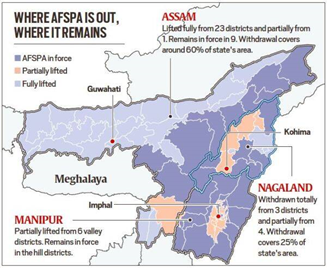

29th April 2022 (6 Topics)
Context
Prime Minister Narendra Modi recently said that efforts were on to improve the law-and-order situation for the controversial AFSPA to be completely lifted from the northeast.
About
What is Armed forces Special Powers Act (AFSPA) 1958?
- The Act came into force in the context of increasing violence in the North eastern States decades ago, which the State governments found difficult to control.
- The Armed Forces (Special Powers) Bill was passed by both the Houses of Parliament and it was approved by the President on September 11, 1958.
- It became known as the Armed Forces Special Powers Act, 1958.
- Powers-
- AFSPA provides for special powers for the armed forces that can be imposed by the Centre or the Governor of a state, on the state or parts of it, after it is declared “disturbed’’ under Section 3.
- The Act defines these as areas that are “disturbed or dangerous condition that the use of armed forces in aid of the civil power is necessary’’.
- AFSPA has been used in areas where militancy has been prevalent
- If reasonable suspicion exists, the army can also arrest a person without a warrant; enter or search premises without a warrant; and ban the possession of firearms.
- Any person arrested or taken into custody may be handed over to the officer in charge of the nearest police station along with a report detailing the circumstances that led to the arrest.
Where is it in use?
- At present, it is in force in Mizoram, Nagaland, Manipur, Assam, J&K, and parts of Arunachal Pradesh

|
Previous experts Recommendation on AFSPA
|
More Articles



